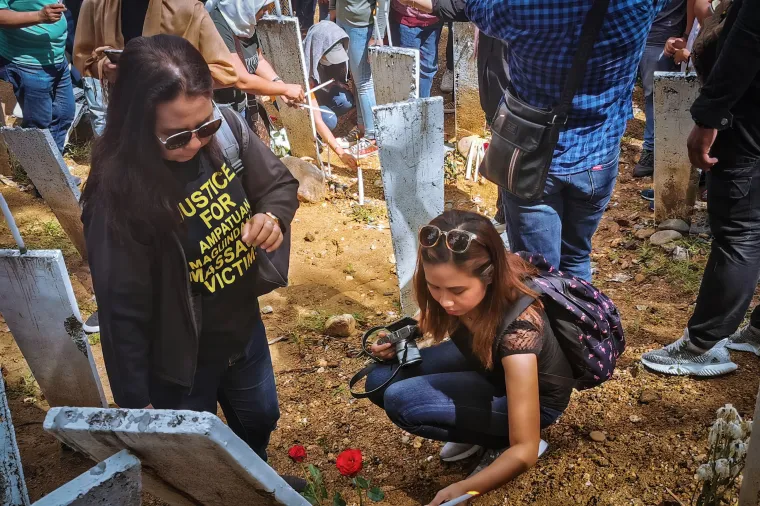When the United Nations Educational, Scientific and Cultural classified the 2009 Maguindanao massacre — the deadliest attack on the press ever recorded by CPJ — as “resolved,” Philippine authorities were quick to echo and tout this designation.
Too quick, as it turned out.
UNESCO’s then-assistant director-general for communication and information, Moez Chackchouk, made the official classification in a September letter to the Philippine government, in which he said the designation would be included in the UN’s Observatory of Killed Journalists and this year’s Director General’s Report on the Safety of Journalists.
Joel Sy Egco, executive director of the Presidential Task Force for Media Security, a state body created by President Rodrigo Duterte to solve media murders, “proudly proclaimed” in a press release on UNESCO’s designation “that the so-called ‘culture of impunity’ against journalists in the country has finally come to an end.”
In the statement, forwarded by the task force to CPJ, Egco said he was “confident” that the Philippines’ rank in CPJ’s Impunity Index would “dramatically improve” due to UNESCO’s designation. The task force, which cooperates with CPJ in providing information and status reports on the cases of murdered journalists, did not reply to CPJ’s emailed requests for further comment.
The Maguindanao massacre, an orgy of political violence that killed 32 journalists and media workers among 58 total victims in November 2009, has not by any credible measure of full justice been resolved, journalists, advocates, and the leader of an organization representing the family members of victims told CPJ.
The massacre’s perpetrators, led by the Ampatuan political clan, initially tried to hide their heinous crime, burying their victims in a big pit grave dug by an industrial-grade backhoe in a remote rural area of the island nation’s violence-prone, southern Maguindanao province.
In 2019, 28 of the accused were convicted of multiple murder and 15 others of serving as accessories to the slaughter, in a case that took a decade to be heard in the Philippines labyrinthine and politicized justice system. The battle for complete justice, journalists, advocates and the families of victims say, is not over.
Far from it: All of the convicted Ampatuan clan members, including the crime’s reputed masterminds Andal Ampatuan Jr. and Zaldy Ampatuan, have appealed their convictions. Those legal challenges, local observers predict, could take years to be heard and eventually reach the Supreme Court, if the defendants exercise all of their appeal options.
Meanwhile, another 80 massacre suspects, among them Ampatuan clan members, remain at large. “Those who are still at large are a threat to the victims’ families, lawyers, witnesses and even those who keep on supporting our case until now,” said Grace Morales, secretary-general of Justice Now, an organization of the slain journalists’ families. “Our case is not resolved yet.”
Justice Now was one of 18 groups and 164 individuals who appealed to UNESCO in a September 12 letter to reconsider its “resolved” designation of the Maguindanao massacre case. The letter called on UNESCO to arrive at a “balanced and comprehensive” assessment of the case “through consultations with key stakeholders, and not only State officials.”
UNESCO walked back its decision on September 24, saying that it now considers the case as “ongoing” after taking into consideration more up-to-date information. Some of the letter’s signatory groups feel the Presidential Task Force for Media Security likewise rushed to declare an “end” of impunity in Philippine media murder cases.
“We wish this was true … but the massacre was but one, albeit the worst, of more than a hundred other fatal attacks on journalists,” said Nonoy Espina, chairperson of the National Union of Journalists of the Philippines, a local press group. “A large number of masterminds and killers still roam free, emboldened by the government’s lack of political will and apathetic attitude towards human rights and press freedom.”
The presidential task force, staffed with former journalists and lawyers, has helped to make progress in certain media killings, including in recent cases where suspects have been identified, arrested and charged in court. However, convictions of both gunmen and masterminds have been scant under Duterte’s administration.
Melanic Pinlac, an independent lawyer and former researcher with the Center for Media Freedom and Responsibility, a local press freedom advocacy group, noted in a recent research report entitled “Renewed Vigilance: Continuing the fight for the Maguindanao 58,” that the massacre convictions, now under appeal, represent only the fourth journalist killing case since 1986 where a mastermind has been found guilty.
That poor conviction record keeps the Philippines on CPJ’s Impunity Index in 2020, albeit it in a lower position than on previous index rankings. At least two journalists, Jobert Bercasio and Rex Cornelio Pepino, have been shot and killed in 2020 in retaliation for their work – so far, with impunity.
To genuinely end the cycle of impunity in media murders, NUJP’s Espina says it will require a fundamental change in the government’s attitude towards journalists. He says his group and others stopped engaging the task force after it “began attacking us because of our continued criticism,” such as in government statements and Facebook posts.
“The overall culture of impunity – not just for media murders, but all other attacks on press freedom – has worsened in large part by President Rodrigo Duterte’s undisguised contempt and hostility toward independent and critical media,” Espina said, noting his government’s shut down of the ABS-CBN news network and legal harassment of Rappler founder Maria Ressa.
And while the Philippine government touts the partial justice achieved in the Maguindanao massacre as the end of impunity, Justice Now’s Morales says: “Our fight is not just for our victims, but also for all the victims of media killings who until now have never been given justice.”
